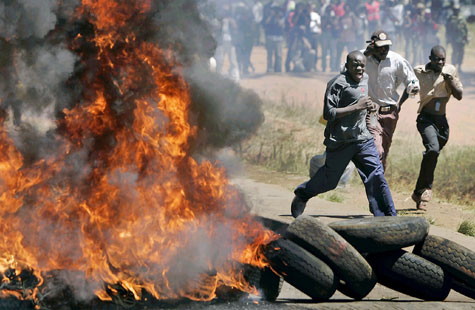
In December 2007, Kenya descended into ethnic violence after a disputed presidential election. There are fears of more deadly disturbances as the country heads to the polls in March 2013. Photo courtesy of http://bit.ly/SXC9uQ
The Sentinel Project has updated its annual assessment on the risk of genocide in Kenya and has maintained Kenya as a situation of concern with the “High” risk rating established in 2011. Our teams of analysts have revised the original report to reflect recent developments that correspond to each of the 30 risk factors in the Sentinel Project’s early warning framework.
While there have been positive developments in Kenya since the post-election violence in 2007-08 with advances in reforming the judiciary and security forces, the underlying sources of tension have not been fully addressed. Significant economic and demographic stresses remain, which can further exacerbate serious ethnic tensions. The country’s history is one of ethnic and political division, polarization, and competition, which has contributed to a political and social order that promote ethnocentrism and inter-tribal antagonism. These divisions often dictate political allegiances and have led to several localized cases of violence, including a recent massacre in the Tana River District as well as anti-Somali riots and military action in other parts of the country. Furthermore, high-level organizers of the 2007-08 violence have not been brought to trial and some now stand as major candidates for the upcoming presidential election.
If the outcome of the March 2013 election is violent, there is high potential for mass atrocities including genocide in Kenya, with groups and individuals likely to take up arms. The most likely scenario will be the occurrence of mass atrocities in a variety of locations throughout the country with the support of local politicians and community leaders. It is not the extermination of a single group by government forces that seem most likely to occur in this case but rather violence influenced by the constitutional amendments approved during the 2010 referendum which changed the country’s governing structure and devolved political power to the regional and local levels. A parallel devolution of political sponsorship for ethnic violence is likely.
In addition to closely monitoring the situation as it develops on a daily basis, the Sentinel Project’s next steps include deploying a small team to Kenya in order to learn more about the work of the dedicated local groups trying to prevent violence in the country.
Click here to read the full assessment report on Kenya.
For more information on our Kenya team, please contact us.
